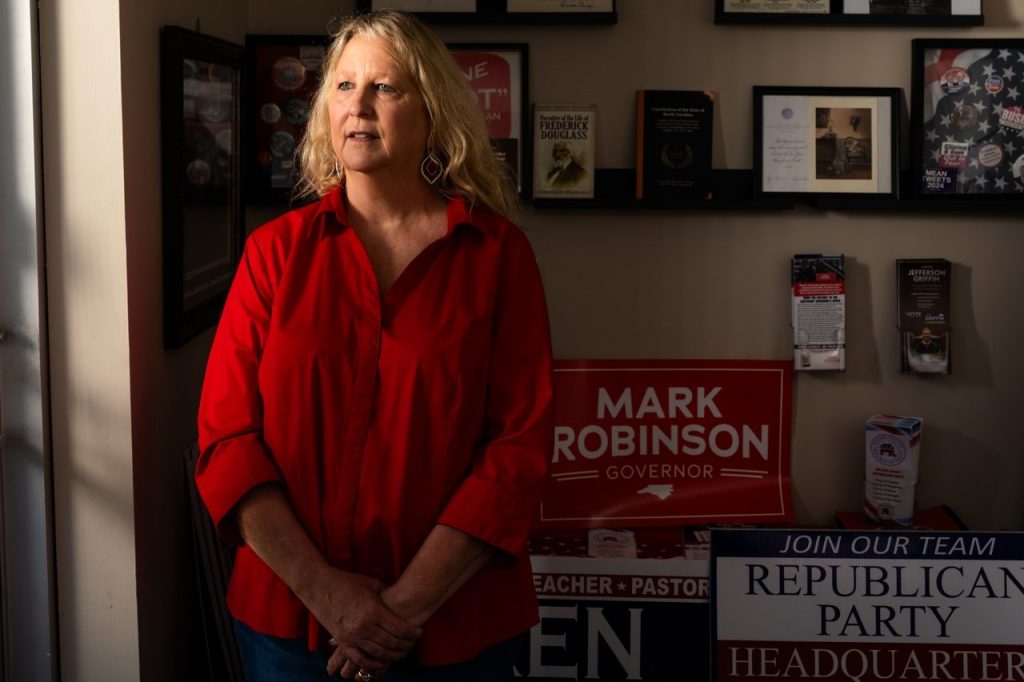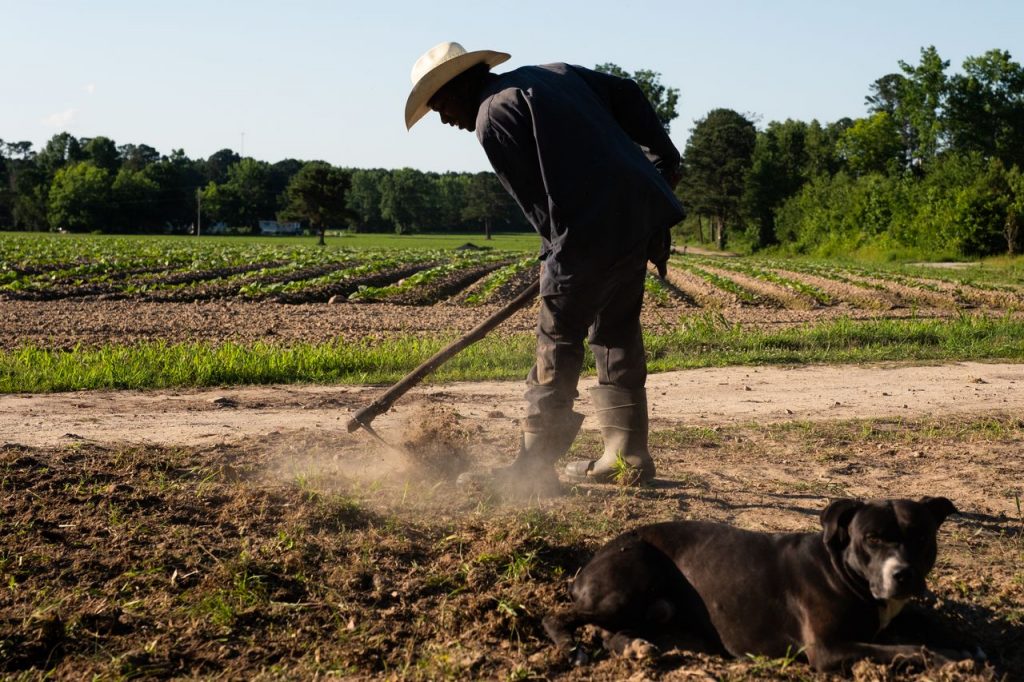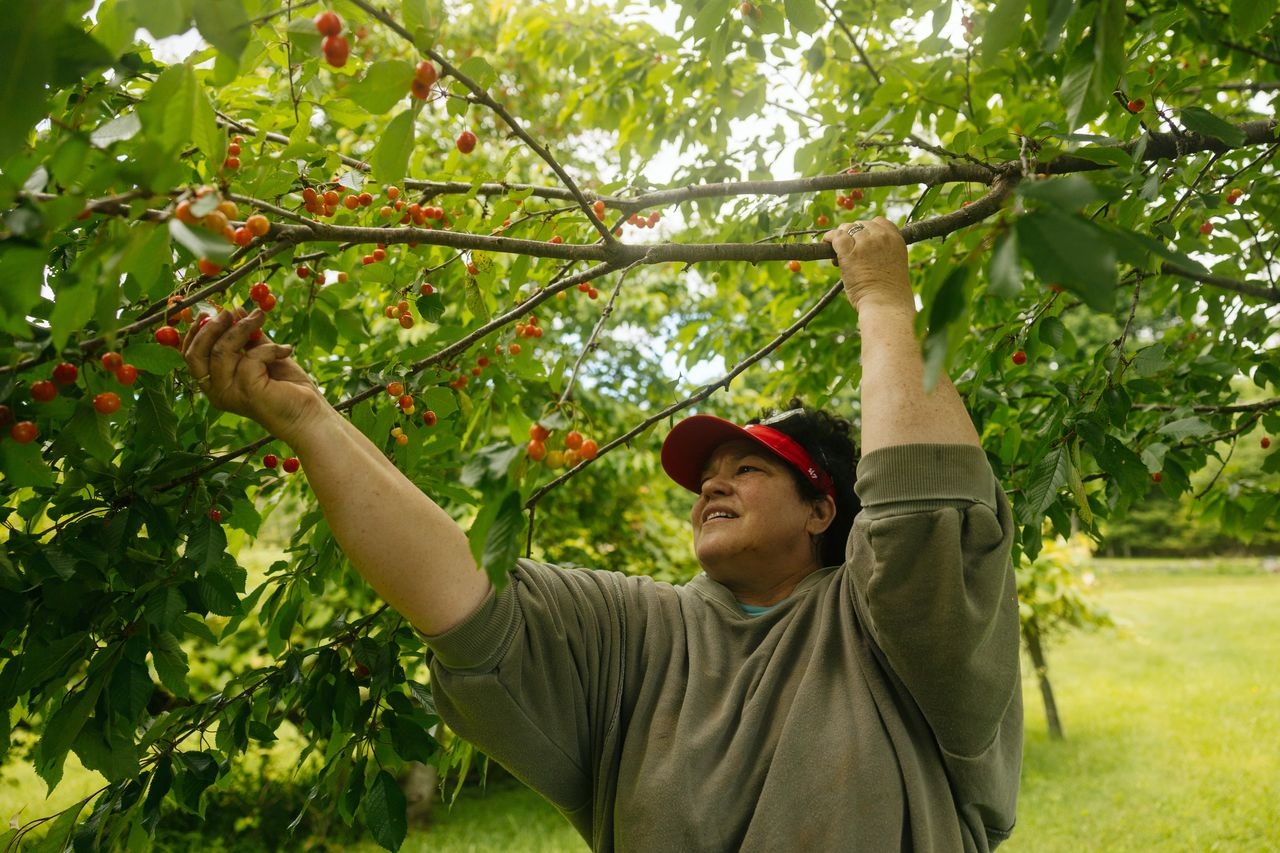WILSON COUNTY, N.C. —Christy Fyle attended her first Wilson County Republican Party meeting in 2015, held in a backroom at Pup’s Steakhouse.
Fewer than a dozen people showed up. They passed a hat to cover rent on the group’s post office box.
Less than a decade later, the Wilson County GOP has its own office-park headquarters, $36,000 in the bank and a voter-turnout operation that helped Republicans carry the county in the 2022 midterm elections, including for Senate and state House.
“We’re reaching people who’ve never been to a Republican event at all,” said Fyle, 54 years old. She served as the county’s party chair during the local GOP’s ascent from 2016 to 2023—growth that has come at the expense of Democrats.

Christy Fyle at the Wilson County Republican Headquarters in Wilson, N.C. PHOTO: CORNELL WATSON FOR THE WALL STREET JOURNAL
Since 2016, the number of registered Democrats has fallen 19% in rural Wilson County, while unaffiliated voters have grown 33%. Republican registration is largely unchanged, and local GOP leaders say their focus will be turning out their voters in November’s presidential election.
The Democratic Party is losing rural voters, an especially serious problem for President Biden’s re-election campaign in North Carolina, the most rural of the battleground states this year. Biden narrowly lost the state in 2020.
Republicans have long held an electoral advantage in rural communities, but many of those areas aren’t growing as fast as cities, which have become Democratic strongholds. Donald Trump has overcome that demographic disadvantage by invigorating GOP turnout across small-town America. Fyle is betting that high gas and food prices will tip the scales Trump’s way in November.
“It’s terrible when you have to decide whether to buy Ruffles or a loaf of bread,” she said.
Biden, who has visited North Carolina several times, faces three Republican advantages there:
North Carolina has the second highest number of people living in rural areas among the states, after Texas. The Census Bureau defines rural as any place with fewer than 2,000 housing units or a population under 5,000. In politics, the definition of rural is more a state of mind.
“Rural has become an identity as much as it’s a place,” said political-science professor Chris Cooper . “How much do you smell weed going down the street? OK, that’s a Democratic precinct. How many churches do you see? OK, that’s a Republican precinct.”
Cooper, co-author of the book, “The Resilience of Southern Identity: Why the South Still Matters in the Minds of Its People,” has firsthand experience. He lives in Sylva, N.C., a town of 2,600, and teaches at Western Carolina University in Cullowhee, N.C., population 7,700.
Rural North Carolinians share a mistrust of the government, some of it linked to political and economic policies that led to the loss of well-paying jobs during the collapse of local manufacturing and farming years ago, according to interviews with roughly two dozen residents. Many believe that Democrats either don’t understand their point of view or don’t want to.
In a March poll conducted in seven battleground states, including North Carolina, The Wall Street Journal found that 62% of voters in rural areas planned to vote for Trump, compared with 47% of all U.S. voters who favor him. More than other voters, poll respondents in rural areas said the U.S. was headed in the wrong direction, the economy was doing poorly and immigration was a top issue.
For generations, the region in the U.S. where a voter lived—the Northeast or Southwest, for instance—largely reflected a particular political alignment, regardless of whether people lived in a city or small town, according to an analysis in “The Rural Voter,” a recent book by Colby College professors Nicholas F. Jacobs and Daniel M. Shea. Starting in the 1980s, America’s political alignment began to split along urban-rural lines.
For presidential races, the margin that the GOP has won blue-collar counties grew from 18 percentage points in 2000 to 44 percentage points in 2020, according to data from the American Communities Project , a demographic research project at Michigan State University.
The Biden campaign has hired 60 people in the state and is opening field offices in both cities and small towns, including one Monday in Sylva, N.C. “It’s going to be a long haul, but rural is worth fighting for,” said Anderson Clayton , the chair of North Carolina’s Democratic Party.
A Biden campaign aide said Democrats in North Carolina had invested in their ground game earlier than usual. Of the states Trump carried four years ago, his margin of victory was slimmest in North Carolina.

Lost seats
In 2008, former President Barack Obama won North Carolina by a thin margin, helped by historic turnout among Black voters in such places as Wilson County, which is 40% Black.
In the 2022 midterms, Democratic-voter turnout plummeted, even in some predominantly Black areas of northeastern North Carolina. Democrats lost five state legislative seats held by Black legislators, helping Republicans reach a veto-proof supermajority.
Dante Pittman , 28, is trying to win back one of those seats. He was recruited by former Gov. Jim Hunt , a Democrat who served four terms before retiring to the Wilson County farm where he grew up. Last summer, Hunt told Pittman he had to step forward before the county slipped out of Democratic control.
Pittman hopes his campaign will appeal to pro-business, socially moderate rural Democrats, once the deciding majority of voters in eastern North Carolina. Democratic Gov. Roy Cooper , who is from Nash County, northeast of Wilson, won re-election in 2020, buoyed by what became known as Trump-Cooper voters.
Pittman has campaigned full time since last fall, knocking on doors most afternoons and visiting churches on Sundays. He talks about economic opportunities, education and local issues, such as the closing of an area’s sole pharmacy.
Pittman said the national party’s message seems to be: The other side is crazy. We’re not. He wants to persuade state and national party leaders that the pitch should be, “Donald Trump is not only corrupt but an economic disaster,” he said.
The issues, he said, are basic: “Can your kids go to a good school? Are there good jobs?”
Pittman has a tough audience, including people he has known for years.
One friendly acquaintance, Ernest Melvin , a longtime Democrat, owns a carwash in Wilson, N.C., population 48,000. When Pittman stopped by to ask if he could put up a campaign sign, Melvin said he would think about it.
The 53-year-old Melvin isn’t sure if he will vote this fall, he said—and if he does, it might be for Trump.
Melvin, who is married and a father, said his business seemed to be doing better when Trump was president. He told Pittman he couldn’t find anyone willing to work during the early days of the Biden administration, when the Covid-19 stimulus money paid people thousands of dollars if they were out of work. “People got lazy,” Melvin said. “They were staying home.”
Some of Melvin’s best customers are Latino, he said, so he doesn’t intend any disrespect to them when he complains that too many immigrants are illegally entering the U.S. along the Mexico border, including those who ferry fentanyl and other drugs.
“I think when Trump was in there, he was trying to get rid of all of that,” Melvin said.
‘I’ll have to pray’
More affluent retirees are moving to West Jefferson, N.C., a picturesque spot in the state’s more mountainous west. Tourists take photos around the town’s quaint downtown, surrounded by mountains so tall that spring has yet to reach the top.
“I can’t tell you how many times I hear in our shop, ‘I feel like I’m in a Hallmark movie,’” said Kelly Vannoy , owner of the Naked Creek Farmacy. “At the same time, you’ve got the challenges of just surviving.”
In Ashe County, roughly 40% of residents make $25,000 or less a year, according to Healthy Communities NC, a state-led data analysis task force. Vannoy sells hemp products from marijuana grown on land her family has farmed for four generations. She also volunteers at a food pantry for lower-income people, including many who inherited land but struggle to pay the property taxes.
Vannoy said she worked the polls for the board of elections in 2020, partly to keep an eye on the process after hearing baseless claims from Trump about a rigged election.
“You hear all this crap on the news and you want to see it for yourself,” Vannoy said. She came away heartened by the apparent security of local elections, she said.
Vannoy, 58, registered as a Democrat at age 18 but switched to unaffiliated several years ago. How will she vote this year? “I’d have to pray about that,” she said.
Trump won 72% of the vote in Ashe County. His message resonates with Bob Waddell , who sells sundries at a roadside stall on the winding road that links West Jefferson to the neighboring town of Jefferson, N.C.
Waddell retired from an electric-components manufacturer that shut down a decade ago, one of many blows to the local economy. Most afternoons, he sits outside his stall, labeled “Yard Sale,” and sells the occasional American flag or used children’s toy.
Waddell, 82, has been a lifelong Democrat but said he wouldn’t vote for Biden. He said he doesn’t like anything about the president. “If Biden gets it again, it’s down the drain,” he said.
Like many in Ashe County, Waddell identifies as a conservative Christian. Trump’s recent conviction in New York didn’t faze him. “I don’t go for Trump’s lifestyle,” he said, “but what he did 20 years ago? I don’t care about that.”
Nancy Beth Weaver , running for county commission as a Democrat, said she doesn’t have a “snowball’s chance in hell” of winning. She is a farmer and weaver who for years demonstrated wool-making at the local farmers market—how to shear sheep and spin fibers on a loom.
Weaver, 58, has seen what illegal drugs have done in her community. First came methamphetamine, then opioid pills and now fentanyl. She has a son who is recovering from drug addiction, and she helps other mothers of addicted children.
She said she feels like she no longer speaks the same language as lifelong friends and acquaintances. She is running to see if she can convince people that Democrats are better at helping people with affordable housing, healthcare and jobs, Weaver said.
At a recent forum, she was asked to give her position on the “woke agenda.”
“I said, ‘I don’t know what the woke agenda is. But if you mean you love people, you take care of people, then I guess I’m woke,’ “ she said. “They had no use for me.”
The same anti-Democratic sentiment growing in Weaver’s neck of the woods is showing up in spots closer to big cities. Mac McCorkle , a former Democratic strategist and currently a professor at Duke University, found that population growth in many of North Carolina’s 28 countrypolitan counties was, and still is, outpacing their surrounding cities. These counties are less racially diverse—commonly 70% white or higher—and have less education and lower incomes than the suburbs around Atlanta, for instance, McCorkle said. Trump carried these counties with 63% of the vote in 2020.
Dallas Woodhouse , a GOP strategist and former executive director of the state party, said countrypolitan voters—who generally align with the political views of their rural counterparts—found what they wanted in Trump, particularly his more restrictive trade and immigration views.
“Trump got a couple of things right from the beginning as far as where the voters are,” Woodhouse said.
Write to Valerie Bauerlein at Valerie.Bauerlein@wsj.com



